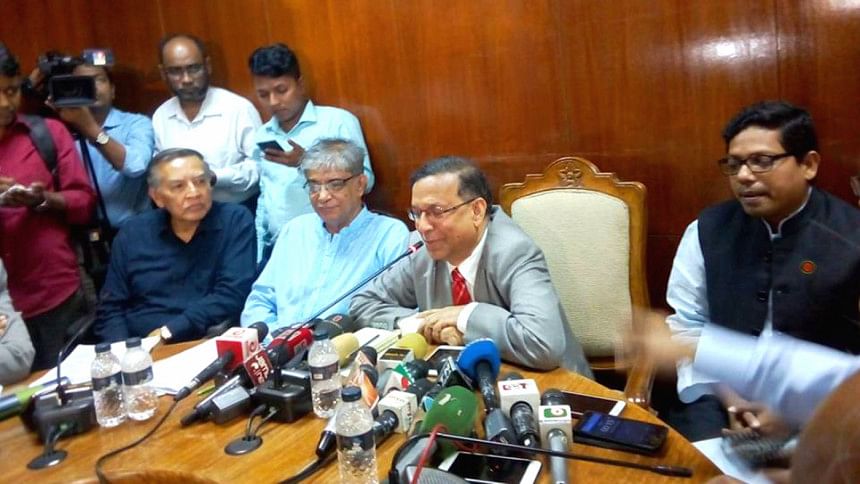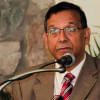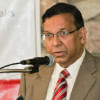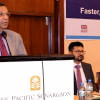Digital Security Act: Editors' worries 'largely logical'

Law Minister Anisul Huq yesterday assured the Editors' Council of removing loopholes and vagueness in the digital security act through the editors' meeting with the parliamentary standing committee on post, telecom, and ICT.
The assurance came at the Editors' Council's meeting with the law minister, Post, Telecom, and ICT Minister Mustafa Jabbar, and State Minister for ICT Zunaid Ahmed Palak at the secretariat.
Editors' Council, an organisation of editors of the country's national dailies, expressed grave concern over section 21, 25, 28, 31, 32, and 43 of the proposed law. It said the sections would greatly hamper freedom of speech and independent journalism.
“After the discussion, we have come to the conclusion that the concerns raised by the Editors' Council over some sections of the digital security act is largely logical,” the minister told reporters.
He also said the parliamentary standing committee on post, telecom, and ICT, which is scrutinising the bill, would sit for a meeting on April 22. He said at that meeting they would ask the parliamentary watchdog to invite the Editors' Council so that it could place its concerns and objections before the committee in writing.
The minister said the aim of the proposed law is to combat cybercrime, not to create any obstacles to freedom of speech or freedom of the press.
“If there is any loophole or vagueness in the bill, in the context of freedom of speech or freedom of the press, Editor's Council will hold discussions with the parliamentary standing committee to remove and amend those.”
Editors' Council General Secretary and The Daily Star Editor and Publisher Mahfuz Anam said there were some sections in the proposed law, in particular section 21, 25, 28, 31, 32, and 43, which go against the freedom of speech and independent journalism.
He said since cybercrimes were being committed using social media and to a large extent uncontrolled online media, they strongly believe a cyber security law was very much necessary.
“Therefore, we want such a law that will truly resist cybercrime. We want a fair law, which will serve its purpose. But it will not reduce freedom of the press.”
Mahfuz Anam also thanked the ministers for acknowledging their concerns over the digital security act and assurance to resolve those.
Prothom-Alo Editor Matiur Rahman, New Age Editor Nurul Kabir, Bangladesh Protidin Editor Naem Nizam, Inqilab Editor AMM Bahauddin, INA Editor Reazuddin Ahmed, Jugantor acting editor Saiful Alam, Naya Diganta Editor Alamgir Mohiuddin, The Financial Express Editor Moazzem Hossain, Kaler Kantha Editor Imdadul Haque Milon, and acting editor of Sangbad Khandaker Muniruzzaman were present at the meeting.
The much-debated Digital Security Bill-2018 was placed in parliament on April 9 amid growing concern from journalists and rights activists that freedom of the press and expression would be put to the sword.
They also observed that there would be every chance of the proposed law being misused against people's right to express, especially due to the inclusion of the controversial section 57 of the ICT Act and some strict provisions in the digital security act.
The government on several occasions said section 57 of the ICT Act would be removed. The section deals with defamation, hurting religious sentiments, causing deterioration of law and order, and instigating against any person or organisation through publishing or transmitting any material in websites or in electronic form. It stipulates maximum 14 years in prison for the offences.
The Digital Security Bill-2018 splits these offences into four separate sections (21, 25, 28 and 29) with punishment ranging from three to 10 years' jail terms.
The cabinet on January 29 approved the draft act.
WHAT SECTION 21,25, 28, 31, 32 and 43 SAYS
Section 21 of the proposed law says anyone spreading negative propaganda against the Liberation War or the Father of the Nation, using digital devices or instigates to do so, will risk being sentenced up to 14 years in jail or a fine of up to Tk 1 crore or both.
He or she will face up to life sentence or Tk 3 crore in fine or both for committing the offence for the second time, it said.
Section 25 says a person may face up to three years in jail or Tk 3 lakh in fine or both if he or she is found to have deliberately published or broadcast in a website or electronic form something which is attacking or intimidating or which can make someone dishonest or disgruntled; knowingly publish or broadcast false and distorted (full or partial) information to annoy or humiliate someone; knowingly publish or broadcast false and distorted (full or partial) information to tarnish the image of the state or to spread rumour.
Second-time offenders will face up to five years in jail or Tk 10 lakh fine or both, it said.
Section 28 says a person may face up to seven years in jail or Tk 10 lakh in fine or both if he or she is found to have deliberately published or broadcast something in website or in electronic form or gets it done to hurt one's religious sentiment and values.
A person will face up to 10 years in jail or Tk 20 lakh or both for committing the offence for the second time, it said.
Section 31 says a person may face up to seven years in jail or Tk 5 lakh in fine or both if he or she is found to have deliberately published or broadcast something in website or in electronic form which can spread hatred and create enmity among different groups and communities and can cause deterioration of law and order.
Second-time offenders can be punished with up to 10 years in jail or Tk 10 lakh in fine or both, it said.
According to section 32 of the proposed law, a person may face up to 14 years in jail or Tk 25 lakh in fine or both on charges of computer spying or digital spying if he or she illegally enters the offices of the government, semi-government, autonomous or statutory bodies and collects or preserves or sends any top secret or secret documents through a computer, digital device, computer network, digital network or any electronic form and help others to do that.
He or she will face imprisonment of up to a life sentence or Tk 1 crore in fine or both for committing the crimes for the second time.
A person may face up to 14 years in jail or Tk 1 crore or both for hacking, section 34 of the bill says.
As per section 43 of the draft law, a police official can search or arrest anyone without a warrant issued by a court.
If a police officer believes that an offence under the proposed law has been committed in a certain place or is being committed, or there is a possibility of crimes, or there is a possibility of destroying evidence, he or she can search the place or any person present there.

 For all latest news, follow The Daily Star's Google News channel.
For all latest news, follow The Daily Star's Google News channel. 








Comments